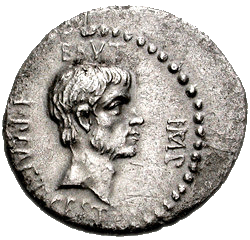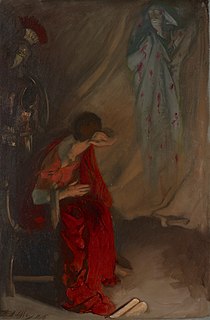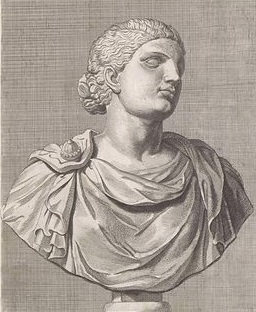Related Research Articles

Gaius Julius Caesar was a Roman general and statesman who played a critical role in the events that led to the demise of the Roman Republic and the rise of the Roman Empire.

Marcus Antonius, commonly known in English as Mark Antony or Anthony, was a Roman politician and general who played a critical role in the transformation of the Roman Republic from a constitutional republic into the autocratic Roman Empire.

Year 44 BC was either a common year starting on Sunday, Common year starting on Monday, leap year starting on Friday, or leap year starting on Saturday. and a common year starting on Sunday of the Proleptic Julian calendar. At the time, it was known as the Year of the Consulship of Julius Caesar V and Marc Antony. The denomination 44 BC for this year has been used since the early medieval period, when the Anno Domini calendar era became the prevalent method in Europe for naming years.

This article concerns the period 49 BC – 40 BC.

Marcus Junius Brutus, often referred to simply as Brutus, was a Roman senator and the most famous of the assassins of Julius Caesar. After being adopted by an uncle, he used the name Quintus Servilius Caepio Brutus, but subsequently returned to his birth name.

The Tragedy of Julius Caesar (First Folio title: The Tragedie of Ivlivs Cæsar) is a history play and tragedy by William Shakespeare first performed in 1599. Although the play is named Julius Caesar, Brutus speaks more than four times as many lines as the title character, and the central psychological drama of the play focuses on Brutus.

Gaius Cassius Longinus, often referred to as simply Cassius, was a Roman senator and general best known as a leading instigator of the plot to assassinate Julius Caesar on March 15, 44 BC. He was the brother-in-law of Brutus, another leader of the conspiracy. He commanded troops with Brutus during the Battle of Philippi against the combined forces of Mark Antony and Octavian, Caesar's former supporters, and committed suicide after being defeated by Mark Antony.

Lucius Junius Brutus is the semi-legendary founder of the Roman Republic, and traditionally one of its first consuls in 509 BC. He was reputedly responsible for the expulsion of his uncle the Roman king Tarquinius Superbus after the suicide of Lucretia, which led to the overthrow of the Roman monarchy. He was involved in the abdication of fellow consul Tarquinius Collatinus, and executed two of his sons for plotting the restoration of the Tarquins.

Publius Servilius Casca Longus was one of the assassins of Julius Caesar. He and several other senators conspired to kill him, a plan which they carried out on 15 March, 44 BC. Afterwards, Casca fought with the liberators during the Liberators' civil war. He is believed to have died by suicide after their defeat at the Battle of Philippi in 42 BC.

The gens Flavia was a plebeian family at ancient Rome. Its members are first mentioned during the last three centuries of the Republic. The first of the Flavii to achieve prominence was Marcus Flavius, tribune of the plebs in 327 and 323 BC; however, no Flavius attained the consulship until Gaius Flavius Fimbria in 104 BC. The gens became illustrious during the first century AD, when the family of the Flavii Sabini claimed the imperial dignity.

The gens Junia was one of the most celebrated families of ancient Rome. The gens may originally have been patrician, and was already prominent in the last days of the Roman monarchy. Lucius Junius Brutus was the nephew of Lucius Tarquinius Superbus, the seventh and last King of Rome, and on the expulsion of Tarquin in 509 BC, he became one of the first consuls of the Roman Republic.

Calpurnia was either the third or the fourth wife of Julius Caesar, and the one to whom he was married at the time of his assassination. According to contemporary sources, she was a good and faithful wife, in spite of her husband's infidelity; and, forewarned of the attempt on his life, she endeavoured in vain to prevent his murder.
Decimus Junius Silanus was a consul of the Roman Republic. He may have been the son of Marcus Junius Silanus, consul in 109 BC. He was the stepfather of Marcus Junius Brutus, having married Brutus' mother, Servilia.
Gaius Epidius Marullus was a Roman tribune most famous for the diadem incident.

Julius Caesar, the Roman dictator, was assassinated by a group of senators on the Ides of March of 44 BC during a meeting of the Senate at the Theatre of Pompey in Rome. The senators stabbed Caesar 23 times. The senators claimed to be acting over fears that Caesar's unprecedented concentration of power during his dictatorship was undermining the Roman Republic, and presented the deed as an act of tyrannicide. At least 60 senators were party to the conspiracy, led by Marcus Brutus, Gaius Cassius and Decimus Brutus. Despite the death of Caesar, the conspirators were unable to restore the institutions of the Republic. The ramifications of the assassination led to the Liberators' civil war and ultimately to the Principate period of the Roman Empire.
The gens Caesetia was a minor plebeian family at ancient Rome. It is known from a small number of individuals living during the late Republic.
The gens Epidia was a plebeian family at Rome. The only members to achieve any importance lived during the first century BC.
References
- ↑ Cassius Dio. Roman History.
- ↑ Plutarch. Life of Julius Caesar.
- ↑ "Character List". Julius Caesar Study Guide. SparkNotes . Retrieved 2008-02-04.